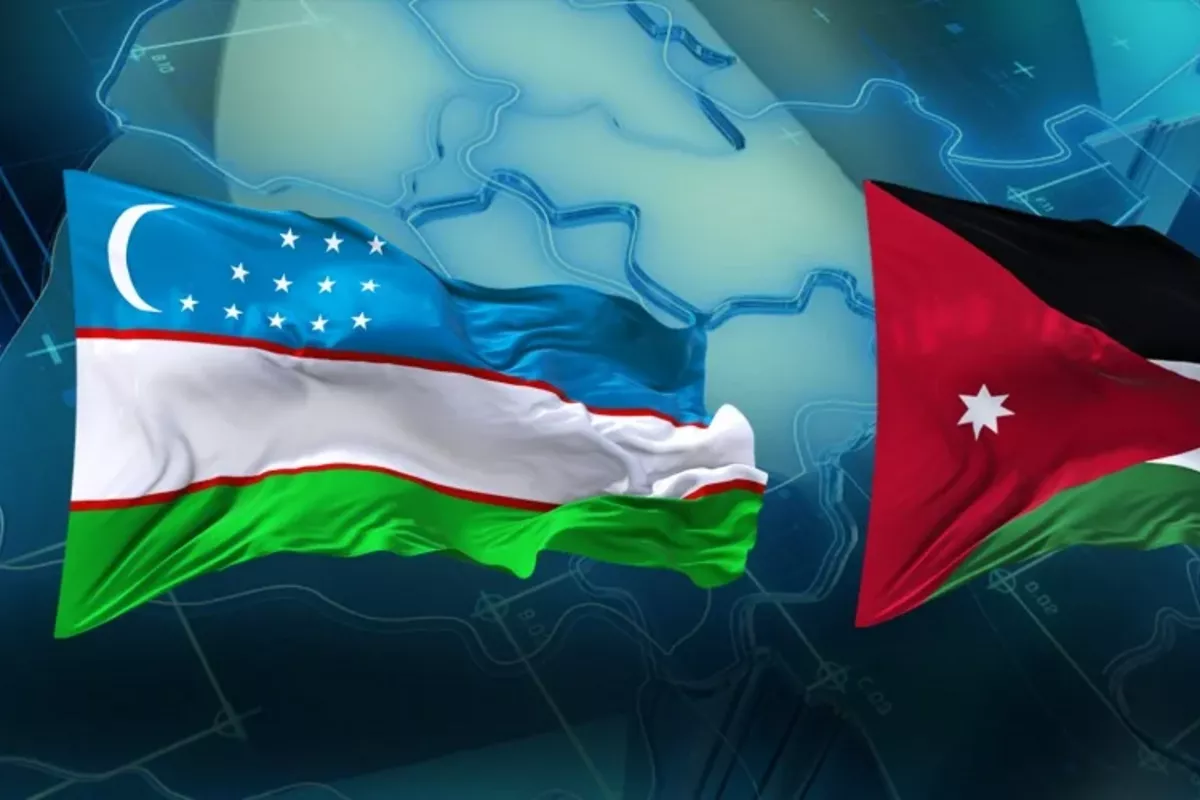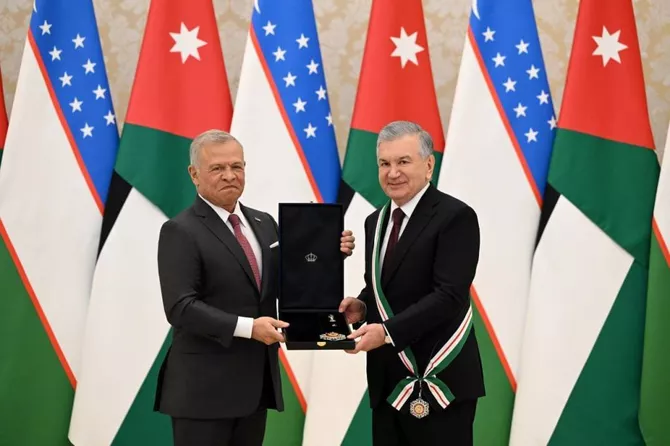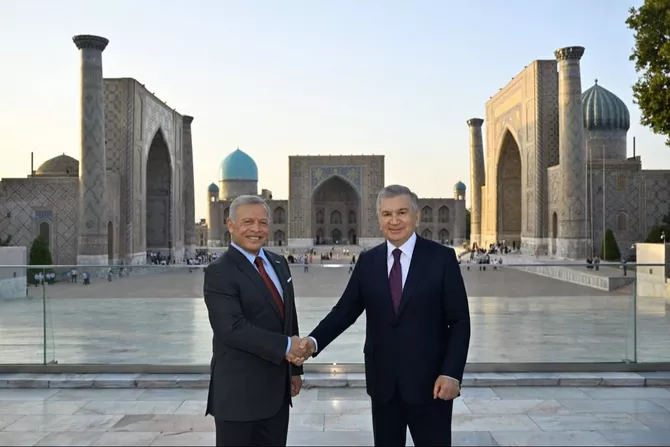
The recent state visit of King Abdullah II ibn Al-Hussein of Jordan to Uzbekistan marked an important milestone in the history of bilateral relations between the two countries. It was the first-ever official visit of a Jordanian monarch to Tashkent, and it opened the way to a new stage of comprehensive partnership. The leaders of both nations used this opportunity to establish the foundations of long-term cooperation across political, economic, cultural, and humanitarian dimensions.
During the visit, Tashkent and Amman signed 15 agreements and memorandums that cover a wide range of areas. These included accords on the mutual promotion and protection of investments, the establishment of a Joint Intergovernmental Commission, the abolition of visa requirements, and cooperation in tourism, higher education, scientific research, and agriculture. A series of memorandums were also concluded in the fields of standardization, metrology, and conformity assessment, as well as a memorandum of understanding on religious affairs, underscoring the importance of dialogue and mutual respect in this sensitive sphere.

One of the symbolic highlights of the visit was the awarding of Jordan’s highest national decoration - the Order of Al-Nahda (“Renaissance”) - to President of Uzbekistan Shavkat Mirziyoyev. In accepting the award, President Mirziyoyev stressed that he considered it not only a recognition of bilateral efforts to expand cooperation but also as a clear sign of respect and friendship toward the people of Uzbekistan, who are “laying the foundations of the Third Renaissance in our country.” Such symbolic gestures underline the mutual trust and respect that now underpin the relationship between the two states.
Economics, however, was at the core of the talks. Among the most concrete outcomes was the decision to develop joint production of mineral fertilizers. Uzbekistan, through its national company Uzkimyosanoat, will export polyvinyl chloride and soda ash to Jordan, while the kingdom, which has strong industrial capacities in phosphorus and potash, will become a key partner in joint projects. Analysts highlight the complementarity of the two economies: Uzbekistan has access to raw materials and reserves, while Jordan has modern production infrastructure. The synergy of these advantages creates the basis for joint ventures aimed at satisfying both domestic needs and the demands of external markets.
In addition, Uzbekistan and Jordan identified promising opportunities in the pharmaceutical sector. The Agency for the Development of the Pharmaceutical Industry under Uzbekistan’s Ministry of Health invited Hikma Pharmaceuticals, Jordan’s flagship pharmaceutical company, to establish production facilities in Uzbekistan. This proposal carries significant potential. Jordan produces around $1.5 billion worth of pharmaceuticals annually, 80-85% of which is exported. Hikma Pharmaceuticals alone is one of the largest suppliers to the American market. By locating production in Uzbekistan, Hikma would gain access not only to Central Asia but also to other post-Soviet markets, while Uzbekistan would acquire new technologies, jobs, and integration into global supply chains.
The visit also had a technological dimension. King Abdullah II visited an exhibition of Uzbek export products, where he was particularly interested in unmanned aerial vehicles produced by Sahro Drone Industry. Today, 80% of the company’s production is fully localized in Uzbekistan, and its portfolio includes quadcopters, reconnaissance drones, FPV models with cameras, and dual-use UAVs. This interaction demonstrated that cooperation between Tashkent and Amman is not limited to traditional sectors like agriculture or industry but is also moving into high-tech domains.
Equally important was the discussion of international security cooperation. President Mirziyoyev proposed holding one of the upcoming sessions of the “Aqaba Process” in Samarkand. Launched by King Abdullah II in 2015, this initiative is aimed at strengthening international coordination in the fight against extremism and terrorism. For Uzbekistan, which is actively promoting regional stability and multilateral dialogue, participation in this process opens an additional platform for engagement with the global community. For Jordan, it demonstrates the expansion of the Aqaba Process into Central Asia, giving it greater international reach.

Beyond bilateral matters, the two leaders reiterated their commitment to supporting initiatives within the framework of the United Nations, the Organization of Islamic Cooperation, and other multilateral institutions. Both sides also agreed to intensify dialogue between their foreign ministries and specialized agencies, thereby ensuring that cooperation is not confined to top-level meetings but is supported by continuous institutional interaction.
Looking forward, both Uzbekistan and Jordan made clear their intention to significantly increase the volume of trade and investment. Plans have already been set in motion to establish a Joint Intergovernmental Commission and a Business Council, with the inaugural Uzbekistan-Jordan business forum scheduled for late 2025. This forum is expected to bring together leading companies and producers from both nations to explore concrete business opportunities. Such initiatives, combined with the abolition of visa requirements, will make it easier for entrepreneurs, investors, and professionals to build practical partnerships.
Cultural and humanitarian exchanges were also high on the agenda. The two countries agreed on the importance of organizing cultural weeks, concerts, art exhibitions, and joint educational programs. Such initiatives are aimed not only at strengthening mutual understanding between the peoples of Uzbekistan and Jordan but also at deepening the human dimension of bilateral relations, which is essential for creating sustainable long-term cooperation. Tourism, in particular, is seen as a promising area, with both sides expecting that simplified visa regimes and closer cultural ties will encourage greater numbers of visitors in both directions.
Analysts underline that Uzbekistan’s diplomacy under President Mirziyoyev continues to be guided by the principles set out in the country’s “Foreign Policy Doctrine”: openness, pragmatism, multilateralism, constructiveness, proactivity, and commitment to peace. These principles have enabled Tashkent to build new partnerships, strengthen traditional ties, and expand its influence on the international stage. The agreements reached with Jordan demonstrate once again that this policy yields tangible results, allowing Uzbekistan to advance its interests while contributing to regional and global stability. As President Mirziyoyev has emphasized: “We build our foreign policy around our single goal - to safeguard the interests of Uzbekistan.”
The state visit of King Abdullah II to Tashkent thus represents far more than a ceremonial event. It is a strategic turning point, opening the door to closer cooperation in diverse fields, from fertilizers and pharmaceuticals to drone technology, cultural exchange, and counter-terrorism. It also highlights the fact that both Uzbekistan and Jordan are seeking to diversify their international ties and to build partnerships that are not only beneficial bilaterally but also contribute to a more stable and interconnected world.
This historic visit underscored that Uzbekistan-Jordan cooperation is no longer limited to formal declarations. It is evolving into a comprehensive partnership with economic, technological, cultural, and security dimensions, laying the groundwork for a truly strategic dialogue that promises long-term benefits for both nations.
Share on social media